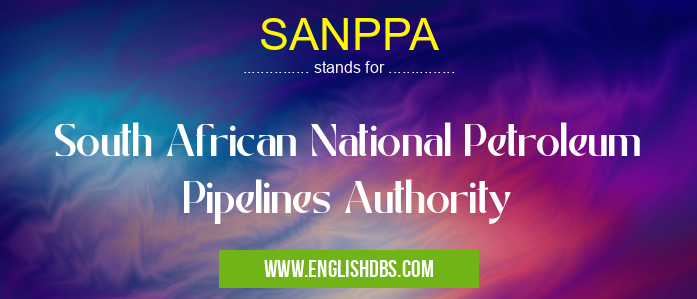What does SANPPA mean in ENERGY
SANPPA's main responsibility is to regulate and oversee the construction, operation, and maintenance of petroleum pipelines in South Africa. This includes issuing licenses, enforcing safety standards, and resolving disputes between pipeline operators and stakeholders.

SANPPA meaning in Energy in Governmental
SANPPA mostly used in an acronym Energy in Category Governmental that means South African National Petroleum Pipelines Authority
Shorthand: SANPPA,
Full Form: South African National Petroleum Pipelines Authority
For more information of "South African National Petroleum Pipelines Authority", see the section below.
» Governmental » Energy
- SANPPA is the acronym for South African National Petroleum Pipelines Authority.
- It is a government agency responsible for regulating and maintaining the petroleum pipelines network in South Africa.
Functions of SANPPA
- Regulation: SANPPA ensures that petroleum pipelines are operated safely and efficiently, in compliance with regulations and standards.
- Licensing: It issues licenses to pipeline operators and monitors their activities to ensure adherence to regulations.
- Inspection: SANPPA conducts regular inspections of pipelines to assess their condition and identify any potential risks.
- Maintenance: It works with pipeline operators to develop and implement maintenance plans to ensure the integrity of the pipeline network.
- Emergency Response: SANPPA coordinates emergency response plans in case of pipeline incidents, ensuring prompt and effective response.
Significance of SANPPA
- Safety: SANPPA's regulations and inspections enhance the safety of petroleum pipelines, reducing the risk of accidents and environmental damage.
- Economic Development: A reliable and efficient pipeline network is crucial for the transportation of petroleum products, supporting economic growth and job creation.
- Environmental Protection: SANPPA's monitoring and enforcement activities help minimize environmental impacts from pipeline operations.
Essential Questions and Answers on South African National Petroleum Pipelines Authority in "GOVERNMENTAL»ENERGY"
What is the primary function of SANPPA?
Why is pipeline regulation necessary?
Pipelines carry flammable and hazardous substances, making their safety paramount. Regulation ensures that pipelines are designed, constructed, and operated according to strict standards to minimize risks to the public, the environment, and property.
What types of pipelines fall under SANPPA's jurisdiction?
SANPPA regulates all pipelines in South Africa used to transport petroleum products, including crude oil, refined fuels, and natural gas. This includes underground, above-ground, and offshore pipelines.
How does SANPPA enforce pipeline safety?
SANPPA conducts regular inspections, reviews pipeline designs and operating procedures, and investigates incidents to ensure compliance with safety standards. The authority can issue fines, suspend licenses, or order pipeline shutdowns if violations are found.
What is the role of stakeholders in pipeline safety?
Stakeholders, including pipeline operators, owners, contractors, and the public, play a crucial role in ensuring pipeline safety. They must adhere to regulations, report incidents, and cooperate with SANPPA's investigations.
Final Words:
- SANPPA plays a critical role in ensuring the safety, reliability, and environmental sustainability of South Africa's petroleum pipeline network.
- Its regulations and monitoring efforts contribute to the protection of public safety, the environment, and the economic well-being of the nation.
